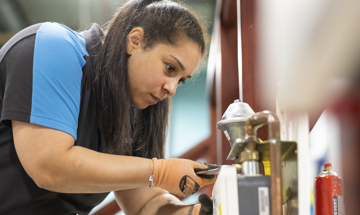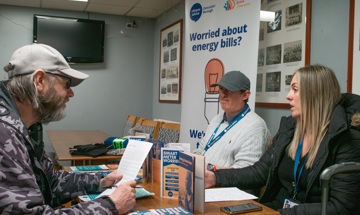Jennifer Plews
Teenage girls want to 'break the glass ceiling' – with nearly four in 10 (37 per cent) wanting a career in a traditionally male dominated field.
A poll of 2,000 girls aged 13 to 19 found a third (33 per cent) of those likely to choose a traditionally male career path would be interested in pursuing a career in science, with a similar number (31 per cent) keen to explore a job in engineering.
81 per cent of these young women believe they are just as capable as their male counterparts of performing roles like carpentry, electrical work and plumbing, and 31 per cent of those believe that they are in fact more capable.
And eight in 10 (80 per cent) say it is important that their career makes a ‘positive contribution’ to society.
The research was commissioned by energy and home services provider British Gas, which has committed to creating 3,500 apprenticeships over the next decade, with the ambition for half of all new recruits to be women.
"My inspiration initially came from my dad, who specialised in the gas field for many years. And with the support of my family, friends and colleagues, my confidence has grown ever since the day I first started as an apprentice. I love providing a valuable service to our customers – helping them save money on energy while reducing their impact on the environment – in a role where I can be my bubbly, caring and smiley self. There are no stereotypes to conform to and we value the diversity in our team."
Jessica Rawstron, British Gas Smart Energy Engineer
44 per cent of girls who are keen to pursue a career in a traditionally male field have been inspired to do so by their family, and 36 per cent have been positively influenced by their teachers.
That’s despite the fact that when quizzed on their own female family members, more than half (56 per cent) said none of them work in a traditionally male dominated industry.
It’s widely acknowledged that times are changing, with an encouraging 64 per cent of girls believing it’s easier for women to get a role in an industry like energy, construction or engineering today, compared to when their mum was the age they are now.
But 62 per cent are convinced their gender will still have some sort of impact on their future job prospects, with seven in 10 (70 per cent) saying there are still barriers that make it difficult for females to land a particular role.
More gender equality within the workplace is the top improvement those polled would like to see for working women in the future (43 per cent).
And having the same job opportunities as men (42 per cent), better help with childcare (39 per cent) and better pay (38 per cent) also featured high on the list.
The study, conducted via OnePoll, found 73 per cent of girls are confident we will see more women in traditionally male dominated roles in the near future.
And although the average female teen reckons it will take 15 years until there is total gender equality within the workplace, 72 per cent agree their generation will be the ones to make this change happen.
Jessica Rawstron from British Gas added: “Young women have more opportunities than ever before – both in terms of the roles available to us, and the impact we can have on the world around us.
“The need to reduce emissions and reach Net Zero is critical, and the skills we learn as Smart Energy Engineers can make a real difference. I’m proud to be playing my part in fighting climate change.”

News
British Gas to Boost its Workforce with 300 New Apprentices
Our people

News
Centrica named one of The Times Top 50 Employers for Gender Equality 2024
Our people

News
Centrica strengthens leadership team with two new senior hires
Our people

News
British Gas Energy Trust creates £250 million in societal benefits
Our people

News
Centrica puts people at the heart of its levelling up work
Our people

News
“We should aim to flip the notion of disability on its head” – Centrica launches disability mentoring scheme
Our people
